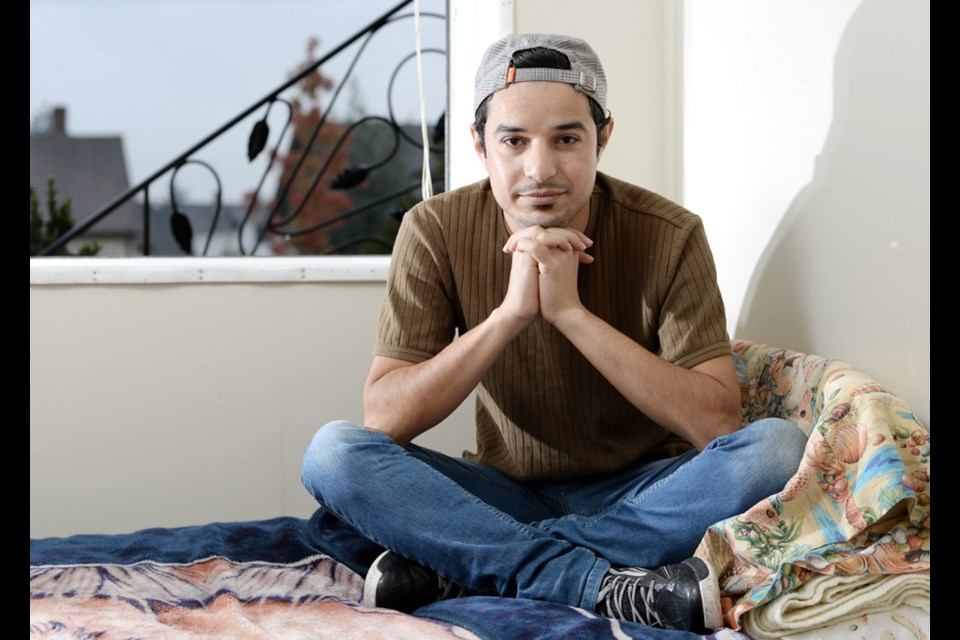Two years ago, when Mohammed Alsaleh was just 24 years old writing a test for medical school, Syrian state forces marched into his classroom and arrested him. He was detained for 120 days, tortured and nearly killed.
“This is why I Ieft my country,” he says. “If I go back, I will be dead.”
He went to neighbouring Lebanon, and with help from the United Nations High Commission for Refugees, came to Canada and settled in New Westminster nine months ago.
But he came alone and left behind three brothers and two sisters – all younger – and his mother. His father passed away 16 years ago.
When people ask how his family’s doing, he’s not sure what to say.
“They are in danger,” he says. “I just say they are still alive luckily, and I don’t know about tomorrow. They might not make it. They might not survive. I might receive bad news any minute,” he says.
“I feel this kind of survival guilt. I made it here. I’m safe and sound. I have a good life, but unfortunately, my family doesn’t,” he says. “They are still in Syria. They are under a very bad situation. There is no life there.”
The world is witnessing the worst humanitarian crisis since the Second World War, and in the midst of it, two of Mohammed’s brothers made the trek to Europe.
The brothers’ crossing
When the body of toddler Alan Kurdi washed up on the shores of the Mediterranean, Mohammed kept thinking of his brothers making that same perilous crossing.
“I was shocked when I saw that picture. At the same period in time, my brothers were doing the same. That little boy could have been my brother,” he says.
But his brothers made it to Greece, Macedonia, Serbia, and then Hungary. Last he heard, they were trying to get out of Hungary, but that was before the wall went up at the Serbian border. On Friday, he heard relieving news. Both brothers, along with four cousins, made it to Germany, safe and sound. They have a place to stay near Munich, with three meals a day, while their papers are being processed.
The conflict behind the refugee crisis
Meanwhile, Mohammed’s remaining siblings and mother are living in the city of Al-Hasakeh, in Syria’s northeast region, where there’s a truce between Kurdish militants and the Syrian regime because the city is under attack from ISIS.
“This situation wouldn’t have gotten this bad if it was resolved in the early stages, when it was just a group of people demanding their rights and asking for change, asking for a dictator to step down,” Mohammed says. “(Assad’s) the real devil. He has killed 500,000 people so far. ISIS has just stepped in the conflict. They have been active for like a year or so. They have killed a few thousand compared to the hundreds of thousands (Assad) killed, you know?”
Mohammed hopes the international community steps in to help end the crisis that’s driving people from their homeland.
“If the world and nations of the world want to find a real solution to end the suffering of the people they will have to resolve the conflict,” he says. “Those people are running from a dictatorship cracking down and using indiscriminate bombs. They bomb cities, without knowing (if they’re) bombing civilians or people with guns. … On the other side they have these terrorist groups that are trying to take over and force their agendas. All of this is forcing people to leave their house, their educations, and have these backpacks going on this horrifying journey through at least eight countries.”
Bringing his family here
Mohammed tries to keep in touch with his family, but with no communication infrastructure, it’s difficult.
“I have tried every single resource here to bring them, but unfortunately it seems impossible,” he says. “Under the current laws in Canada, it’s not possible to bring them.”
Mohammed has thought about sponsorship, but that requires a group of five people with thousands of dollars to guarantee the financial stability of the family for the first year. Mohammed doesn’t even know five people in Canada. Meanwhile, he’s going to night classes to retrain as a medical assistant to help nurses and volunteering as a translator to help other refugees. He gave up on his dream of becoming a doctor when he discovered he would have to start eight years of studies from scratch.
Like all government-assisted refugees, Mohammed got settlement help from Immigrant Services Society, which is now calling on the Canadian government to make things easier for family reunification.
“I wish that would happen,” he says.
The only thing that keeps him going
“I have seen lots of bad stuff, I have been through a lot, and I’ve seen lots of people dying. I’ve lost a lot of friends during that time,” Mohammed says, his voice trailing off, clearly upset.
The only thing that keeps him going is his family.
“I tried to bring them here,” he said. “I hope current laws change, and the change will help me bring them (here.) Until then, I will do whatever I can to do a new life, get a job and support them with money.”



